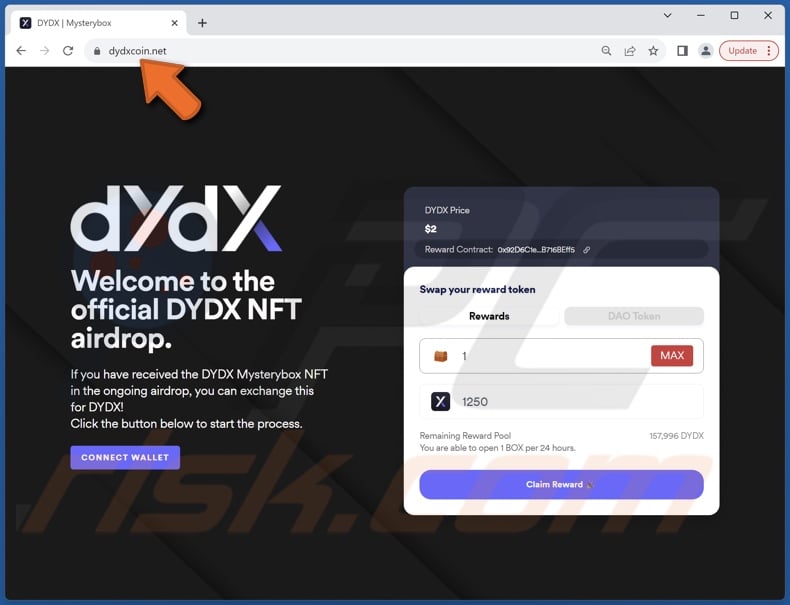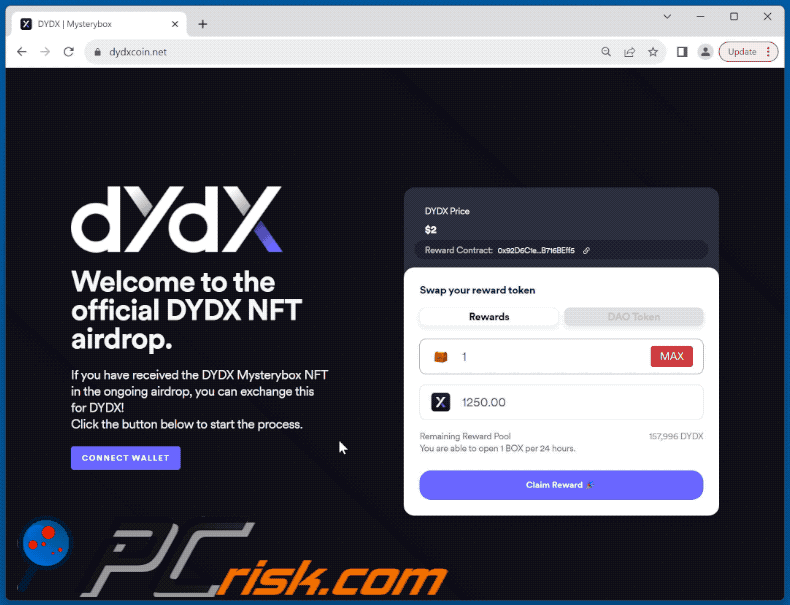Avoid getting scammed by fake "DYDX NFT Airdrop" websites
Phishing/ScamAlso Known As: "DYDX NFT Airdrop" crypto drainer scam
Get free scan and check if your device is infected.
Remove it nowTo use full-featured product, you have to purchase a license for Combo Cleaner. Seven days free trial available. Combo Cleaner is owned and operated by RCS LT, the parent company of PCRisk.com.
What is the fake "DYDX NFT Airdrop"?
After inspecting this "DYDX NFT Airdrop", we determined that it is fake. This scam impersonates the dYdX decentralized exchange (dydx.exchange). The scheme runs an airdrop, and when users attempt to participate – they expose their cryptocurrency wallets to a crypto drainer.

IMPORTANT NOTE: We do not review crypto projects, please do your own research when investing money.
Federal Trade Commission (FTC) states that since the start of 2021, more than 46,000 people have reported losing over $1 billion in crypto to scams – that's about one out of every four dollars reported lost, more than any other payment method.
Fake "DYDX NFT Airdrop" overview
Unlike many drainer-type scams, the "DYDX NFT Airdrop" is not an identical copy of an existing platform. However, the scheme did use the logo of the dYdX decentralized exchange. While the fake page did not use a typosquatting technique (misspelled URL), its domain – dydxcoin[.]net – does resemble that of the actual dYdX, which is dydx.exchange. Keep in mind that this scam could be hosted on other domains.
It must be emphasized that this fraudulent airdrop is not associated with any real platforms or other legitimate projects/entities.
The lure utilized by the scheme is an "official DYDX NFT airdrop". Users who have received the DYDX Mysterybox NFT in this giveaway can exchange it for DYDX cryptocurrency. When the "Claim Reward" button is clicked, the user is prompted to connect their digital wallet. Once "connected", the scam executes scripts for a cryptocurrency drainer.
The draining mechanism facilitates transfers from victims' wallets to ones owned by cyber criminals. Some drainers can roughly estimate the value of digital assets and prioritize them.
Cryptocurrency transactions cannot be reversed because of their nearly untraceable nature. Hence, victims of scams like "DYDX NFT Airdrop" – cannot retrieve their funds.
| Name | "DYDX NFT Airdrop" crypto drainer scam |
| Threat Type | Phishing, Scam, Social Engineering, Fraud, Cryptocurrency Drainer |
| Disguise | Airdrop on dYdX decentralized exchange platform. |
| Related Domains | l2dydx[.]top, dydx-foundation[.]net, dydxcoin[.]net, dydxdrop[.]life, allocation-dydxexchange[.]org |
| Detection Names (dydxcoin[.]net) | Heimdal Security (Phishing), Full List Of Detections (VirusTotal) |
| Serving IP Address (dydxcoin[.]net) | 172.67.187.185 |
| Distribution methods | Compromised websites, social media spam, rogue online pop-up ads, potentially unwanted applications. |
| Damage | Monetary loss |
| Malware Removal (Windows) |
To eliminate possible malware infections, scan your computer with legitimate antivirus software. Our security researchers recommend using Combo Cleaner. Download Combo CleanerTo use full-featured product, you have to purchase a license for Combo Cleaner. 7 days free trial available. Combo Cleaner is owned and operated by RCS LT, the parent company of PCRisk.com. |
Cryptocurrency drainer scam examples
"Claim RWA", "PepeFork ($PORK) Registration", "Merlin Swap Airdrop", "Blaster Token ($BLSTR) Early Access", and "Dog RuneStone Airdrop" are just some examples of crypto drainers we have written about recently.
Cryptocurrency-centered scams operate in one of three main ways: draining funds from exposed digital wallets, phishing for cryptowallet log-in credentials, or tricking victims into manually transferring funds to scammer-owned wallets.
Users are baited into trusting these schemes by various false claims, e.g., ones relating to airdrops/giveaways, new token/coin promotions, wallet/account issues, security updates, etc.
While online scams can be plain and riddled with errors, drainer-type schemes tend to look quite legitimate. Some of these scams are perfect copies of legitimate platforms/websites.
How did I open a scam website?
Malvertising is commonly used in cryptocurrency-draining scam promotion. Specifically, these schemes are pushed via intrusive pop-up advertisements. The pop-ups can be fully operational drainers themselves; they lure users into "connecting" digital wallets by promising various benefits. It is pertinent to mention that these adverts have been encountered on legitimate sites that had been compromised.
Social media spam is also prevalent in cryptocurrency-specific scam endorsement. The promotional posts and DMs/PMs can be made using hacked accounts (i.e., originally belonging to reputable projects, companies, organizations, celebrities, influencers, entrepreneurs, etc.) – thus, scammers create a sense of legitimacy.
However, other promotional methods are possible. Online scams are generally endorsed through websites using rogue advertising networks, different types of spam (e.g., emails, SMSes, browser notifications, forum posts, etc.), typosquatting (mistyped URLs), malvertising, and adware.
How to avoid visiting scam websites?
The Internet is rife with deceptive and malicious content – therefore, we strongly advise caution while browsing. Pay attention to URLs and enter them carefully. Be selective about which sites are allowed to display browser notifications; do not permit suspect pages to do so, and instead ignore or deny these requests (i.e., by clicking "Block", "Block Notifications", etc.).
Do not use websites offering pirated programs/media or other questionable services (e.g., illegal streaming/downloading, Torrenting, etc.), as these webpages are usually monetized via rogue advertising networks. Be vigilant with incoming emails; do not open attachments/links found in suspicious mail.
Download only from official/trustworthy sources and approach installations with care (e.g., read terms, explore options, use "Custom/Advanced" settings, opt out of additional apps, extensions, etc.) – to prevent bundled/harmful software from infiltrating the device.
If your computer is already infected, we recommend running a scan with Combo Cleaner Antivirus for Windows to automatically eliminate all threats.
The appearance of "DYDX NFT Airdrop" scam (GIF):

Other examples of DYDX airdrop-themed drainer websites:
Sample 1 (dydxdrop[.]life):
![DYDX Airdrop scam website dydxdrop[.]life](/images/stories/screenshots202405/dydx-nft-airdrop-scam-update-2024-05-09-another-variant.jpg)
Sample 2 (dydx-foundation[.]net):
![DYDX NFT Airdrop Scam website (dydx-foundation[.]net)](/images/stories/screenshots202508/dydx-nft-airdrop-scam-update-2025-08-04-another-variant2.jpg)
Screenshot of the official dYdX website (dydx.exchange):

Instant automatic malware removal:
Manual threat removal might be a lengthy and complicated process that requires advanced IT skills. Combo Cleaner is a professional automatic malware removal tool that is recommended to get rid of malware. Download it by clicking the button below:
DOWNLOAD Combo CleanerBy downloading any software listed on this website you agree to our Privacy Policy and Terms of Use. To use full-featured product, you have to purchase a license for Combo Cleaner. 7 days free trial available. Combo Cleaner is owned and operated by RCS LT, the parent company of PCRisk.com.
Quick menu:
- What is "DYDX NFT Airdrop" crypto drainer scam?
- How to identify a pop-up scam?
- How do pop-up scams work?
- How to remove fake pop-ups?
- How to prevent fake pop-ups?
- What to do if you fell for a pop-up scam?
How to identify a pop-up scam?
Pop-up windows with various fake messages are a common type of lures cybercriminals use. They collect sensitive personal data, trick Internet users into calling fake tech support numbers, subscribe to useless online services, invest in shady cryptocurrency schemes, etc.
While in the majority of cases these pop-ups don't infect users' devices with malware, they can cause direct monetary loss or could result in identity theft.
Cybercriminals strive to create their rogue pop-up windows to look trustworthy, however, scams typically have the following characteristics:
- Spelling mistakes and non-professional images - Closely inspect the information displayed in a pop-up. Spelling mistakes and unprofessional images could be a sign of a scam.
- Sense of urgency - Countdown timer with a couple of minutes on it, asking you to enter your personal information or subscribe to some online service.
- Statements that you won something - If you haven't participated in a lottery, online competition, etc., and you see a pop-up window stating that you won.
- Computer or mobile device scan - A pop-up window that scans your device and informs of detected issues - is undoubtedly a scam; webpages cannot perform such actions.
- Exclusivity - Pop-up windows stating that only you are given secret access to a financial scheme that can quickly make you rich.
Example of a pop-up scam:

How do pop-up scams work?
Cybercriminals and deceptive marketers usually use various advertising networks, search engine poisoning techniques, and shady websites to generate traffic to their pop-ups. Users land on their online lures after clicking on fake download buttons, using a torrent website, or simply clicking on an Internet search engine result.
Based on users' location and device information, they are presented with a scam pop-up. Lures presented in such pop-ups range from get-rich-quick schemes to fake virus scans.
How to remove fake pop-ups?
In most cases, pop-up scams do not infect users' devices with malware. If you encountered a scam pop-up, simply closing it should be enough. In some cases scam, pop-ups may be hard to close; in such cases - close your Internet browser and restart it.
In extremely rare cases, you might need to reset your Internet browser. For this, use our instructions explaining how to reset Internet browser settings.
How to prevent fake pop-ups?
To prevent seeing pop-up scams, you should visit only reputable websites. Torrent, Crack, free online movie streaming, YouTube video download, and other websites of similar reputation commonly redirect Internet users to pop-up scams.
To minimize the risk of encountering pop-up scams, you should keep your Internet browsers up-to-date and use reputable anti-malware application. For this purpose, we recommend Combo Cleaner Antivirus for Windows.
What to do if you fell for a pop-up scam?
This depends on the type of scam that you fell for. Most commonly, pop-up scams try to trick users into sending money, giving away personal information, or giving access to one's device.
- If you sent money to scammers: You should contact your financial institution and explain that you were scammed. If informed promptly, there's a chance to get your money back.
- If you gave away your personal information: You should change your passwords and enable two-factor authentication in all online services that you use. Visit Federal Trade Commission to report identity theft and get personalized recovery steps.
- If you let scammers connect to your device: You should scan your computer with reputable anti-malware (we recommend Combo Cleaner Antivirus for Windows) - cyber criminals could have planted trojans, keyloggers, and other malware, don't use your computer until removing possible threats.
- Help other Internet users: report Internet scams to Federal Trade Commission.
Frequently Asked Questions (FAQ)
What is an online scam?
An online scam refers to a type of deceptive content promoted on the Web. It is intended to deceive users into performing certain actions, e.g., connecting digital wallets to cryptocurrency drainers, making monetary transactions, providing vulnerable information, downloading/installing software, buying products, subscribing to services, and so on.
What is the purpose of online scams?
Online scams aim to generate revenue at victims' expense. Profit can be made by acquiring funds through deception, promoting content (e.g., websites, software, products, services, etc.), selling/abusing private data, proliferating malware, and so forth.
I have lost digital assets to the "DYDX NFT Airdrop" scam, can I get my money back?
Cryptocurrency transactions cannot be reversed due to their practically untraceable nature. Hence, victims of scams like this fake "DYDX NFT Airdrop" cannot recover their funds.
Why do I encounter online scams?
Online scams are mainly endorsed via websites using rogue advertising networks, spam (e.g., emails, DMs/PMs, SMSes, social media/ forum posts, browser notifications, etc.), typosquatting (mistyped URLs), malvertising (intrusive adverts), and adware.
Will Combo Cleaner protect me from online scams?
Combo Cleaner is designed to scan visited sites and detect rogue, deceptive, and malicious pages. Hence, should you happen upon such a webpage – you will be warned immediately, and further access to it will be blocked.
Share:

Tomas Meskauskas
Expert security researcher, professional malware analyst
I am passionate about computer security and technology. I have an experience of over 10 years working in various companies related to computer technical issue solving and Internet security. I have been working as an author and editor for pcrisk.com since 2010. Follow me on Twitter and LinkedIn to stay informed about the latest online security threats.
PCrisk security portal is brought by a company RCS LT.
Joined forces of security researchers help educate computer users about the latest online security threats. More information about the company RCS LT.
Our malware removal guides are free. However, if you want to support us you can send us a donation.
DonatePCrisk security portal is brought by a company RCS LT.
Joined forces of security researchers help educate computer users about the latest online security threats. More information about the company RCS LT.
Our malware removal guides are free. However, if you want to support us you can send us a donation.
Donate
▼ Show Discussion